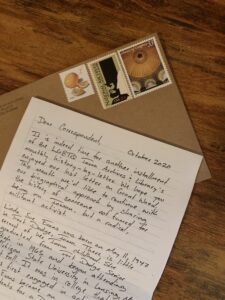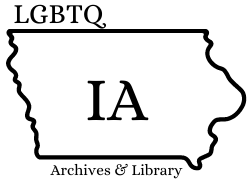 This month we’d like to continue with our biographical approach by sharing the history of someone not famed for being an Iowan, but a radical, militant activist.
This month we’d like to continue with our biographical approach by sharing the history of someone not famed for being an Iowan, but a radical, militant activist.
Linda Sue Evans was born on May 11, 1947 in Fort Dodge, Iowa. There is little record of her Iowa childhood. She graduated from Fort Dodge SeniorHigh in 1965 and began attending Michigan State University in Lansing, MI that fall. It was in college that Evan first engaged in activism. In 1967 Evans became an active member in Students for a Democratic Society (SDS).
SDS grew out of an early Twentieth Century socialist labor organization, the League for Industrial Democracy. Founded in 1959, SDS had its roots in both labor organizing and the Civil Rights Movement. It was the Vietnam War and the growing anti-war movement that made SDS the most powerful student organization in the New Left.1
SDS provided Evans the opportunity to become heavily involved with the anti-war movement. Leaving MSU in 1967 to become a full time activist, Evans served as a regional organizer for SDS. In 1969, Evans traveled to North Vietnam as part of an anti-war delegation to receive three prisoners of war. While in Hanoi, Evans gave a speech at a mass rally that was broadcasted throughout Southeast Asia.
The trip to Vietnam clearly radicalized Evans, who spoke about the trip at a number of rallies on her return home. According to Evans speaking in 1969, “We have begun to understand that the peaceful demonstrations and marches that we’ve had are not enough.” She continues, “The rulers of America have not been affected by our protest, or by our demonstrations, or by our anger.” And here is the shift in Evans’ activist methods, “The time has come that they must not be allowed to have peace in this country while the war in Vietnam…continues.”2
Evans’ shift in methods of activism was accompanied by a shift in organizations. In 1969, Evans left SDS, which was beginning to fall apart, and joined the radical outgrowth of SDS, the Weather Underground. Famed for bombings across the U.S. throughout the 1970s the radical, violent, left wing group incited Evans to participate in violent action. 1970 is when Evans began a criminal record, arrested for protests and actions throughout the country in Pittsburgh and Chicago.
In January of 1970, Evans was arrested at her parents’ home in Fort Dodge and charged with conspiracy to commit bombings in major cities throughout the country and riot conspiracy for the Weather Underground’s Day of Rage in October of 1969.3 Following her three months in jail for the charges she faced, Evans moved to Texas, eventually landing in Austin.
What Evans and others experienced as members of the Weather Underground was persistent misogyny from the male leadership. As the organization began to dissolve in the late 1970s, much like its predecessor SDS in the 1960s, Evans and other women from the Weather Underground formed a new militant group. Operating under a range of names historically including the Revolutionary Fighting Group, the Armed Resistance Unit, and the REd Guerilla Resistance, this radical women’s organization is now most commonly known as the May 19th Communist Organization (M19Co).4
M19Co chose this name because May 19th is the shared birthday of Malcolm X and Ho Chi Minh – two of their communist idols. This group is the first and still considered the only all women terrorist group in the U.S. Many, if not all of the women involved, were lesbians. It is unclear when Evans came out, but it is tremendously clear that her lesbian identity played a critical role in her activism:
Being a lesbian has always been an important part of the reasons why I’m a revolutionary!… Because I experience real oppression as a lesbian and as a woman, I am personally committed from the very core of my being to winning liberation for women lesbians, and all oppressed people.5
Evans has consistently seen solidarity and intersectionality at the very core of her activism.
This ethos is seen in the work of M19Co, who opposed U.S. Imperialism and saw sexism, capitalism, racism, and homophobia as tools of the imperial nation state. Anti-imperialist action, therefore, would lead to national, even global liberation for all oppressed people. M19Co took an approach that sought to damage the infrastructure of the U.S. nation state by conducting a series of bombings from 1982 to 1985 targeting federal buildings. No people were harmed in any M19Co bombings as they called each facility a few minutes ahead of detonation.6
On October 21st, 1981 some members of M19Co in collaboration with the Black Liberation Army committed armed robbery of a Brinks Armored truck in Nanuet, NY. They stole 1.6 million dollars, killed one Brinks guard, two police officers, and injured two other Brinks guards. This was ultimately the crime that brought down M19Co. Members had to go further underground to hid from FBI agents while continuing their bombings.
On May 11, 1985 Evans was arrested for harboring one of the Brinks robbery fugitives. On top of this charge, Evans was found with a number of gun and explosives links as the armorer for M19Co. On March 20, 1981 she was found guilty and sentenced to 40 years in prison. While incarcerated, Evans served as an AIDS peer counselor and began advocating for the rights of incarcerated people. On January 20, 2001, on his final day in office, President Bill Clinton commuted Evans’ sentence after she served 16 years.7
Linda Sue Evans lives in California with her partner Eve Goldberg. She is an active advocate against the Prison Industrial Complex. Her roots will forever be Iowan.
In love and solidarity
Notes
- William W. Riggs, “Students for a Democratic Society,” The First Amendment Encyclopedia, 2009, mtsu.edu/first-amendment/1201/students-for-a-democratic-society. To learn more about SDS, check out Harvey Pekar’s Students for a Democratic Society: A Graphic History from our soon to open lending library! Don’t worry, we’ll send mail and social media posts when the library is open and ready for COVID-safe book borrowing.
- William Rosenau, Tonight We Bombed the U.S. Capitol: The Explosive Story of M19, America’s First Female Terrorist Group (New York: Atria Books, 2020), 122-123. Rosenau’s book will also be borrowable through our lending library, precisely because it is one of, if not the only, books that covers Evans’ life as an activist. Unfortunately, this text is clearly unsympathetic to activists and Rosenau persistently refers to all women in the text by their first names and men by their last – a sexist mode of writing.
- “Iowa Weatherman Waives Hearing,” Ames Daily Tribune (Ames, IA), Jan. 2, 1970; “Fort Doge Woman Agrees to Face Bombing Charges,” Estherville Daily News (Estherville, IA), Jul. 28, 1970; Rosenau Tonight We Bombed the U.S. Capitol, 123-124.
- Philip Shenon, “U.S. Charges 7 in the Bombings at the U.S. Capitol,” The New York Times (New York, NY) May 12, 1988.
- Joy James, Imprisoned Intellectuals: America’s Political Prisoners Write on Life, Liberation, and Rebellion (Lanham, MD: Rowman & Littlefield, 2004), 275.
- Rosenau, Tonight We Bombed the U.S. Capitol, 11; Shenon, “U.S. Charges 7.”
- Rosenau, Tonight We Bombed the U.S. Capitol, 105-111.
